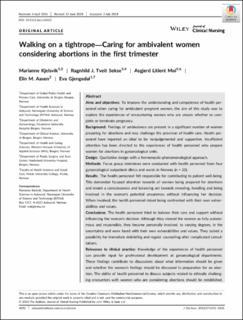Walking on a tightrope : caring for ambivalent woman considering abortions in the first trimester
Kjelsvik, Marianne; Sekse, Ragnhild Johanne Tveit; Moi, Asgjerd Litleré; Aasen, Elin Margrethe; Gjengedal, Eva
Peer reviewed, Journal article
Published version

Åpne
Permanent lenke
https://hdl.handle.net/11250/3026984Utgivelsesdato
2018Metadata
Vis full innførselSamlinger
- Artikler [412]
- Publikasjoner fra Cristin [429]
Sammendrag
Aims and objectives To improve the understanding and competence of health personnel when caring for ambivalent pregnant women, the aim of this study is to explore the experiences of encountering women who are unsure whether to complete or terminate pregnancy. Background Feelings of ambivalence are present in a significant number of women preparing for abortions and may challenge the provision of healthcare. Health personnel have reported an ideal to be non-judgmental and supportive. Insufficient attention has been directed to the experiences of health personnel who prepare women for abortions in gynecological units. Design Qualitative design with a hermeneutic-phenomenological approach. Methods Focus group interviews were conducted with health personnel from four gynecological outpatient clinics and wards in Norway (n=20). Results The health personnel felt responsible for contributing to patient well-being. This demanded focused attention towards all women being prepared for abortions and meant a consciousness and balancing act towards revealing, handling and being involved in the woman’s potential unsureness without influencing her decision. When involved, the health personnel risked being confronted with their own vulnerabilities and values. Conclusions The health personnel tried to balance their care and support without influencing the woman’s decision. Although they viewed the women as fully autonomous and responsible, they became personally involved, to varying degrees, in the uncertainty and were faced with their own vulnerabilities and values. They lacked a possibility for immediate debriefing and regular counseling after complicated consultations. Relevance to clinical practice Knowledge of the experiences of health personnel can provide input for professional development at gynecological departments. These findings contribute to discussions about what information should be given and whether the woman's feelings should be discussed in preparation for an abortion. The ability of health personnel to discuss subjects related to ethically challenging encounters with women who are considering abortions should be established, namely, professional education and workshops at the national level and small groups with counseling and case study discussions at hospitals.
